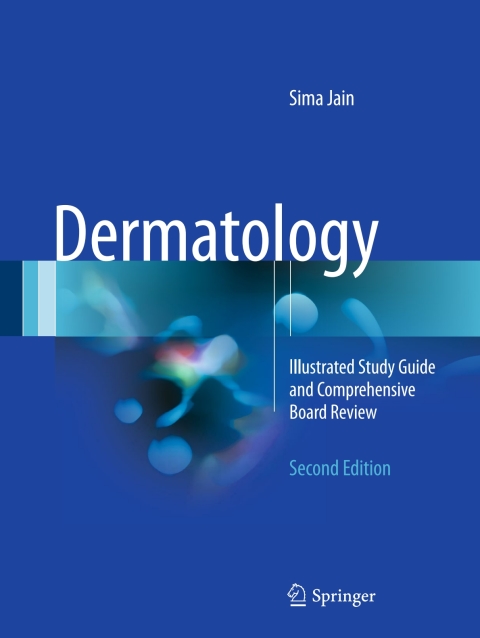Description
Efnisyfirlit
- Foreword
- Preface
- Acknowledgements
- Author and Editor
- Contents
- Contributors
- 1: Basic Science and Immunology
- 1.1 Embryology
- 1.2 Epidermis
- 1.3 Basement Membrane Zone (Bmz)
- A. Inferior Portion of Basal Keratinocyte
- B. Lamina Lucida
- C. Lamina Densa
- D. Sublamina Densa
- 1.4 Melanocytes, Langerhans, and Merkel Cells
- 1.5 Dermis
- 1.6 Appendageal Glands and Nerves
- A. Glands
- B. Nerves
- 1.7 Hair and Nails
- 1.8 Wound Healing and Cytokines
- 1.9 Immunology
- A. Non-cellular Component
- B. Cells of the Immune System
- References
- 2: Pediatric Dermatology
- 2.1 Neonatal Dermatology
- 2.2 Childhood Infectious Diseases
- 2.3 Papulosquamous and Eczematous Dermatoses
- 2.4 Pigmented Lesions
- 2.5 Hypopigmented Lesions
- 2.6 Bullous Diseases
- 2.7 Epidermal, Appendageal and Dermal Tumors
- 2.8 Tumors of Fat, Muscle and Bone
- 2.9 Vascular Disorders
- A. VASCULAR TUMORS
- B. VENOUS MALFORMATIONS
- C. TELANGIECTASIAS
- 2.10 Genodermatoses
- A. SYNDROMES WITH DEFECTIVE DNA REPAIR
- B. SYNDROMES OF TUMOR SUPPRESSION
- C. Syndromes with Premature Aging
- D. DISORDERS WITH IMMUNODEFICIENCY
- E. DISORDERS OF PIGMENTATION
- F. MISCELLANEOUS
- G. VASCULAR DISORDERS
- H. DERMAL DISORDERS
- I. DISEASES OF THE HAIR AND NAILS
- J. DISORDERS OF CORNIFICATION
- K. OTHER CONDITIONS
- References
- 3: General Dermatology
- 3.1 Acne and Related Conditions
- A. Acne Vulgaris and Special Forms (Tables 3-1, 3-2)
- B. Acneiform Conditions
- C. Rosacea (Figure 3.4A-C)
- D. Rosacea Variants
- 3.2 Papulosquamous, Lichenoid and Eczematous Dermatoses
- A. Papulosquamous Dermatoses
- B. Lichenoid Dermatoses
- C. Eczematous Dermatoses
- 3.3 Granulomatous, Metabolic and Depositional Diseases
- A. Granulomatous Diseases
- B. Metabolic and Depositional Diseases
- 3.4 Erythemas and Purpuras
- A. Erythemas
- B. Purpuras
- 3.5 Vesiculobullous Diseases (Figure 3.29 and 3.30, Table 3-17)
- 3.6 Connective Tissue Diseases
- A. Autoimmune Serology (Table 3-18)
- B. Connective Tissue Diseases
- C. Other Connective Tissue Diseases
- 3.7 Disorders of Fat (Tables 3-20, 3-21, 3-22)
- 3.8 Pregnancy Dermatoses
- 3.9 Vasculitides and Vaso-Occlusive Diseases
- 3.10 Eosinophilic and Neutrophilic Dermatoses
- 3.11 Pigmentary Disorders and Vitamin Deficiencies
- 3.12 Cutaneous Manifestations of Systemic Diseases
- 3.13 Disorders of Hair
- A. Non-scarring Alopecias
- B. Scarring Alopecias
- C. Hirsutism (Figure 3.55b)
- D. Hair Shaft Abnormalities (Figure 3.57)
- 3.14 Neuropsychocutaneous Disorders
- 3.15 Oral Diseases
- 3.16 Nail Diseases
- 3.17 Photodermatoses
- A. Em Spectrum and Biological Effects
- B. Endogenous Photodermatoses
- C. Exogenous Photodermatoses
- D. Chemicals Blocking UVR
- E. Miscellaneous
- References
- 4: Infectious Diseases
- 4.1 Viral Infections
- A. HUMAN HERPESVIRUSES (HHV)
- B. HUMAN PAPILLOMAVIRUS (HPV) (Table 4-1)
- C. POXVIRUS INFECTIONS
- D. MISCELLANEOUS (Tables 4-3 and 4-4)
- 4.2 Bacterial Infections
- A. GRAM-POSITIVE INFECTIONS
- STAPHYLOCOCCAL INFECTIONS:
- STREPTOCOCCAL INFECTIONS
- CORYNEBACTERIAL INFECTIONS
- Other Gram-Positive Infections
- B. GRAM-NEGATIVE INFECTIONS
- PSEUDOMONAL INFECTIONS
- Other Gram-Negative Infections
- Bartonella Infections
- Rickettsiae
- Spirochetes
- C. Mycobacteria
- Atypical Mycobacteria
- Fungal Infections
- A. Definitions
- B. Superficial Mycoses
- C. Dermatophytosis
- D. DEEP MYCOSES
- Dimorphic Fungi
- Opportunistic Infections
- 4.3 Protozoa and Worms
- 4.4 Infestations
- 4.5 Creatures of Significance
- References
- 5: Benign and Malignant Tumors
- 5.1 Benign Epidermal and Dermal Tumors
- 5.2 PREMALIGNANT AND MALIGNANT TUMORS
- 5.3 Cysts
- References
- 6: Dermatologic Surgery
- 6.1 Surgical Anatomy
- A. Anatomy of Head and Neck Muscles (Figure 6.1)
- B. Sensory innervation of Head and Neck (Figure 6.3 and 6.4B, Table 6-3)
- C. Motor Innervation of Head and Neck
- D. Arterial Supply of Head and Neck (Figure 6.6, Table 6-5)
- E. Lymph Nodes of the Head and Neck
- 6.2 Excisions, Flaps, and Grafts
- A. Excisions
- Basic Excision Principles
- Cosmetic subunits
- Wound Healing
- B. Flaps
- C. Grafts
- Full-Thickness Skin Graft (FTSG)
- Split-Thickness Skin Graft (STSG)
- Composite Graft
- Stages of Graft Survival (Table 6-8)
- 6.3 Surgical Complications
- 6.4 Cryosurgery and Electrosurgery
- 6.5 Pre-operative Considerations
- 6.6 Local Anesthesia
- 6.7 Sutures, Antiseptics, and Dressings
- 6.8 Nail Surgery
- 6.9 Cosmetic Dermatology
- References
- 7: Pharmacology and Drug Reactions
- 7.1 Anti-infective Medications
- A. Antibiotics
- B. Antifungals
- C. Antivirals (Table 7.2)
- D. Anti-Parasitic Drugs
- 7.2 Immunosuppressant Drugs
- A. Topical Immunosuppressants
- B. Oral Immunosuppressants
- C. Immunomodulators
- D. Antimalarials
- E. Chemotherapy Agents
- 7.3 Other Drugs
- A. Retinoids
- B. Hormone-Related Drugs
- C. Antihistamines
- D. Phototherapy
- F. Pregnancy Category
- 7.4 Drug Reactions and Interactions
- References
- 8: Pathology
- 8.1 Stains
- 8.2 HISTOLOGIC BODIES
- 8.3 Histopathologic Findings
- 8.4 Histopathologic Images
- References
- 9: Dermoscopy and Electron Microscopy
- 9.1 Dermoscopy
- 9.2 ELECTRON MICROSCOPY (EM)
- References
- 10: Life After Boards
- 10.1 Advice for Life After Boards
- My Personal Words of Wisdom
- 10.2 Taking the Job
- Employment Contract
- Employee Vs. Independent Contractor
- 10.3 Coding and Documentation
- A. Coding for the Office Visit
- New Outpatient E/M Codes:
- Established Outpatient E/M Codes:
- B. Coding for Procedures
- C. Documentation
- 10.4 Continuing Medical Education
- References
- 11: High Yield Facts and Buzz Words
- 11.1 Genetic Diseases
- 11.2 JAIN BuzzWords
- Index







Reviews
There are no reviews yet.